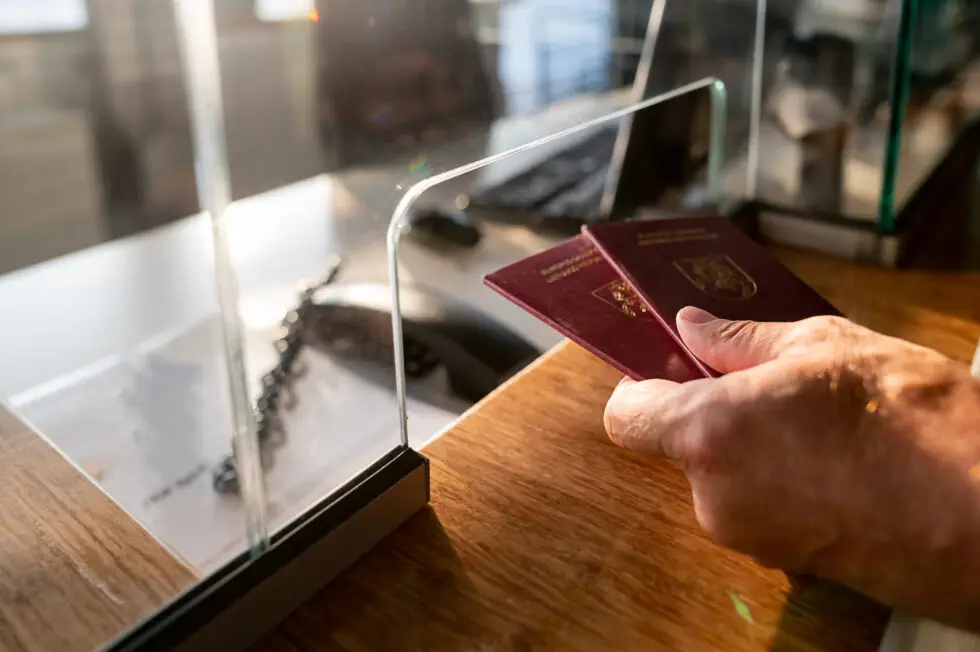What does § 3 AufenthG regulate?
The passport requirement under Section 3 of the Residence Act (AufenthG) is one of the central requirements for foreigners who wish to enter or reside in Germany. In this section you will find out to whom the passport requirement applies and which documents you need to fulfill this legal requirement.
The passport requirement for foreigners in Germany
According to § 3 of the Residence Act, foreigners may only enter Germany or stay in the federal territory if they have a recognized and valid passport or passport substitute.
This rule ensures that the identity and nationality of the person can be clearly traced. By fulfilling the passport requirement, you create a prerequisite for obtaining a residence permit in accordance with § 5 AufenthG in the first place.
The legal basis is § 3 paragraph 1 AufenthG.
Legal text § 3 Paragraph 1 AufenthG: "Foreigners may only enter or reside in the federal territory if they have a recognized and valid passport or passport substitute, unless they are exempted from the passport requirement by statutory order. For their stay in the federal territory, they also fulfill the passport requirement by possessing a passport substitute(§ 48 Para. 2)."
In concrete terms, this means
- Entry only with a valid passport or passport substitute.
- A corresponding document must also be available for the stay in Germany.
However, there are exceptions for certain groups, which can be approved by the Federal Ministry of the Interior (BMI) in justified individual cases.
Recognized passports and passport substitutes according to § 3 AufenthG
A recognized passport is usually the passport you receive from your country of origin. If you do not have a passport or cannot obtain one in time, there are alternatives such as a replacement passport or replacement ID card.
An example of this is the travel document for foreigners in accordance with Section 5 of the Residence Ordinance (AufenthV ). These documents also fulfill the passport requirement and allow you to legally reside in Germany.
The law therefore offers you several options for fulfilling the passport requirement, depending on which documents are available to you.

Exemptions from the passport requirement
Even though the passport requirement applies to most foreigners, there are certain cases in which this rule can be waived. In this section you will find out when and under what conditions the passport requirement can be waived and who decides on these exceptions.
In which cases can the passport requirement be waived?
In some special situations, the passport requirement for foreigners can be waived by way of exception. However, this only happens in clearly defined exceptional cases.
These cases include, among others:
- Entry in urgent individual cases: If there are special circumstances that require immediate entry, a temporary exception may be granted.
- Inability to obtain a passport: If it is demonstrably impossible to obtain a passport, an exemption from the passport requirement may be granted in individual cases.
- Humanitarian reasons: The passport requirement may also be waived for asylum seekers or refugees who do not have access to travel documents.
However, these exemptions are only temporary and are usually subject to strict conditions. It is important that you find out in good time whether you can benefit from such an exemption.
Responsibility of the Federal Ministry for Exceptions
The Federal Ministry of the Interior (BMI) or an authority designated by it is responsible for deciding on exceptions to the passport requirement. These decisions are generally only made in special individual cases and after careful examination.
If you believe that you could fall under such an exemption, you should contact the relevant authorities at an early stage. An application for exemption must be well-founded and the decision is ultimately at the discretion of the authority.
The legal basis is Section 3 (2) AufenthG.
Text of the law: "The Federal Ministry of the Interior, Building and Community or the authority designated by it may, in justified individual cases, allow exceptions to the passport requirement for crossing the border and a subsequent stay of up to six months before the foreigner enters the country."
Legal consequences of a breach of the passport requirement
Failure to comply with the passport requirement can have considerable legal consequences for foreigners in Germany. It is therefore important to take the regulations seriously and ensure that you always have the necessary documents. In this section, we explain what happens if you cannot produce a valid passport or passport substitute and how to avoid such violations.
Possible consequences of missing passport or passport replacement
Anyone who cannot present a valid passport or passport substitute risks various legal measures. The authorities in Germany are obliged to punish violations of the passport requirement.
The possible consequences include
- Refusal of entry: Without valid documents, entry to Germany can be refused at the border and no visa can be issued.
- Fines: Fines may be imposed if the passport requirement is breached.
- Termination of residence: In serious cases, the Residence permit can be withdrawn and expulsion can be initiated.
- Prohibition of further residence applications: Missing documents can lead to applications for a residence permit or Naturalization being rejected.
How can violations be avoided?
To avoid problems with the passport requirement, you should note a few important points:
- Apply for documents in good time: Apply for your passport or passport replacement early to avoid delays.
- Keeping your documents safe: Always keep your documents to hand, especially when traveling abroad or visiting the authorities.
- Compliance with passport validity: Make sure that your passport or passport replacement is always valid and is renewed on time.
- Check for exceptions: Find out whether an exemption from the passport requirement is possible in your case and apply for it if necessary.
Obligations under Section 48 AufenthG in connection with the passport requirement
In addition to the passport requirement under Section 3 AufenthG, there are further legal requirements that are regulated in the Residence Act. § Section 48 AufenthG describes the legal obligations of foreigners living in Germany with regard to identification. In this section, you will find out which documents you must carry with you and the significance of these obligations in connection with the passport requirement.
Document requirements for foreigners
According to § 48 AufenthG, as a foreigner you are obliged to carry certain documents with you at all times and to present them to the competent authorities on request. These obligations apply regardless of whether you have a Residence permit or are staying in Germany temporarily. The most important documents include
- Passport or passport substitute: This fulfills the passport requirement and must always be valid.
- Residence permitIf you have a residence permit, EU Blue Card or Settlement permit , these must also be shown on request.
- Replacement ID: If you have neither a passport nor a replacement passport, you must carry at least one replacement ID with you to confirm your identity.
It is necessary to show these documents to prove your identity, citizenship and legal residence in Germany.
What documents must be submitted to the authorities?
The document requirement under Section 48 AufenthG goes beyond simply carrying a passport.
You are also obliged to hand over the following documents to the authorities on request:
- Passport or passport replacement: You must present your identity documents in the event of checks or official inquiries.
- Residence permit or certificate from Tolerance permit: These documents show your residence status in Germany.
- Documents to establish your identity: These include birth certificates, citizenship certificates and other relevant documents that help to establish your identity or citizenship.
If you do not comply with these obligations, you risk legal consequences. It is therefore important to always have the required documents to hand.
What is the significance of § 3 AufenthG in the naturalization process?
The passport requirement according to § 3 AufenthG plays a central role in the naturalization process. Without a valid passport or passport substitute, it is often not possible to apply for German citizenship.
Some important points that you should consider in the naturalization process are
- Proof of identity: A valid passport is important to prove your identity. Applications to Naturalization cannot be processed without this document.
- Verification of residence status: In addition to your passport, you must also provide proof of your legal residence in Germany for at least 5 years (with the new Naturalization Act), which requires the presentation of a valid residence permit.
- Exceptional cases in the absence of a passport: In rare cases, e.g. in the case of refugees or asylum seekers, the passport requirement may be waived if there is no possibility of obtaining a passport. They must prove that they have attempted to obtain a passport and obtain alternative identity documents. There is a step-by-step model for this Clarification of identity
Here is a video about Naturalization without a passport and the tiered model
Difference between passport requirement and identity card requirement
The terms "passport requirement" and "ID requirement" are often used interchangeably, but there are clear differences in German residence law. While the passport requirement is regulated in § 3 AufenthG and requires a valid passport or passport substitute, the ID requirement relates to proof of identity, which can also be fulfilled by a passport substitute under certain conditions. In this section, you will find out when a replacement passport is sufficient and what this looks like in practice.
When is a replacement ID card sufficient?
In certain cases, a substitute identity document instead of a passport may be sufficient to meet the requirements of the identification obligation. This applies in particular if you are unable to present a passport or if it is impossible to obtain a passport.
The cases in which a replacement ID card is accepted include
- Refugees or asylum seekers: People who cannot prove their identity with a passport are often allowed to use a substitute ID card
- If your nationality is unclear: If your nationality is not clear or no passport is available, a replacement ID card will be issued with the note "Personal data" according to your own details!
- Persons with protection against deportation: People who fall under § 25 AufenthG and are allowed to stay in Germany for humanitarian reasons can get by with a replacement ID card under certain conditions.
However, it is important to know that the ID replacement is not a full replacement for the passport and only serves as proof of identity in special cases.
Practical examples from the field
In practice, there are various situations in which a replacement ID card can be used.
Here are some typical examples:
- Naturalization procedure without a passport: Alternative identity documents (birth certificate, marriage certificate, etc.) are required for a refugee who is unable to present a passport. These then serve as proof of identity for the application to Naturalization.
- Registration with authorities: Anyone in possession of a replacement identity document can present this to registration authorities or social welfare offices as identification if they do not have a passport. However, this is not valid for Clarification of identity. Alternative identity documents are required here.
- Police checks: Persons without a passport can present the replacement ID card as proof of identity during police checks.
In these cases, a replacement passport fulfills the basic requirement of the identification obligation, but only for a limited period and with clearly defined restrictions. It therefore remains important to always obtain a valid passport or passport substitute if possible.
Conclusion on the passport requirement according to § 3 AufenthG
As you can see, the passport requirement under Section 3 AufenthG serves to ensure identity and specifies which documents are required. Here we have summarized the most important points for you and drawn a conclusion on the topic.
The most important key points of Section 3 AufenthG
Passport or passport substitute for entry and residence:
- Every foreigner must have a valid passport or a recognized passport substitute in order to enter and stay in Germany.
- The documents must always be valid and presented in the original.
Exceptions to the passport requirement:
- In special cases, if it is demonstrably not possible to obtain a passport, the presentation of a passport may be waived.
- Instead, the identification requirement is met by alternative identity documents or a passport substitute or special certificates from authorities.
Legal consequences of violations:
- A breach of the passport requirement can lead to refusal of entry or deportation.
- Other possible sanctions include fines and the rejection of applications for residence or Naturalization.
Future and conclusion on Section 3 AufenthG
As the passport requirement guarantees the establishment of identity, it remains a central component of the right of residence. Compliance with this obligation minimizes legal risks and supports a smooth naturalization process. For you as a foreigner, § 3 AufenthG is therefore of central importance in order to be able to clarify your identity for your Residence permit and later the application for Naturalization .
FAQ - The most frequently asked questions about § 3 AufenthG
§ Section 3 of the Residence Act regulates the passport requirement for foreigners who wish to enter or stay in Germany. A valid passport or passport substitute is mandatory.
The passport requirement applies to all foreigners who wish to enter or stay in Germany.
Yes, in certain individual cases, e.g. for humanitarian reasons or if no passport can be obtained, the Federal Ministry of the Interior or the Foreigners' office , among others, can approve an exception.
A valid passport or a recognized passport substitute is required to enter the country.
A violation can lead to fines, refusal of entry or, in the worst case, termination of residence.








